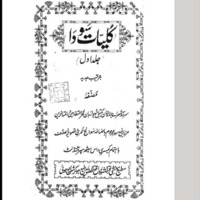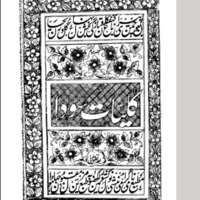Kulliyat Sauda
Item
Title
Kulliyat Sauda
Description
Selected Excerpts:
ASHOBIYA SHIR
sabii se har sahr mujh ko lahu ki bas ati hai
caman men ah gulcin ne yeh kis bulbul ka dil tora (Sauda)
Every morning I experience the smell of blood in the breeze
Alas the heart of a bulbul (tittering nightingale) is injured by a gulcin (flower gatherer)
Note: Caman is both literally “flower garden”, a metaphor for the heart, and a rhyme for Dakkan (deccan) reinforcing it's origin and use as a metaphor for home/location
--------------------------
bagh-e Dilli men jo ik roz hu'a mera guzar
na vo gul hi nazar aya na vo gulshan na bahar
One day I passed through the garden city Delhi
Neither flowers nor garden nor the spring existed there
-----------------------------
abad shahr-e dil tha usi shahryar tak
pahunca na ko'i phir is ujre diyar tak
The city of heart remained spirited till my crowned head
Nobody got to this city of ruins after her
-----------------------------
mulk-e dil qatl kar ke Sauda ka
lashkar-e husn yun palata hai
After slaying the heart land of Sauda
The army of beauteous has returned victoriously
----------------------------
rone ki Sauda tathir kya kahun main
`alam ke dil ko jin ne khun-ab kar diya
O Sauda how can I express the deep effects of your weeping
It has turned the heart of the world into pure blood
-----------------------------
SHAHR ASHOB
ghora le agar, naukari hain kisu ki
tankhah ka phir `alam-e bala pe makan hai
guzre hai sada yun `urf o dana ki khatir
shamshir jo ghar men to sipar baniye ke yahan hai
If they own a horse and are employed by someone
Their chance of payment would remain beyond the universe
To provide the grass and grain to the horse
Some times they keep the sword at home
But the scabbard is pledged to the moneylender
--------------------------------
sipahi rakhte the naukar amir daulatmand
sau amad in ki to jagir se hu'i hai band
kiya hai mulk ko muddat se sar-kashon ne pasand
jo ek shakhs hai ba'is sube khawand
rahi na is ke tasarruf men faujdari-e Kol
The chiefs and the nobles kept the soldiers in service
But the revenue from their estates has been cut off
The country for a long time in the grip of refractories
One who is the master of twenty-two provinces
Has lost even the faujdari of Kol
-------------------------------
Those in the country are strong and seditious, what amirs [nobles] there are are feeble,
And those who detain us on the road are in cahoots with them,
Their masters cannot collect even a quarter of the harvest. . . .
---------------------------------
In commerce the problem you'll have is this:
You buy goods in Ispahan and sell in the Deccan
Every morning you fret over reaching your destination in one piece
And every night you make frantic tallies of loss and gain
---------------------------
If you take your goods to some great man’s door
You'll hear rare and choice terms of address.
And an onlooker will assume, from the prices you settle for,
That the goods you sell are obviously "hot";
Even when you've agreed upon your terms
You'll have to go to his 'ãmil [agent] for satisfaction,
Who will look at your receipt and say,
"now, where would I have that kind of money?"
So you go back to his lordship again
Who, having squandered all this money, goes into hiding
So you can't go calling and expect to find him at home.
The minute he hears you he'll change his own voice
And call out from the house,
"This is Kishan Chand's place”
---------------------------------
"... the attendants of the Diwan and Bakhshi
. . . Are scattered like atoms wherever you look . . .
With the change left over from bargaining for melons,
Unaccounted for, these deputies build houses I
couldn't describe."
------------------
"... Should you be a mullah you'll be so honored
They'll give you two rupees for the recitation of a whole masnavi
How shall I tell you, Brothers, of what that can buy?
A small cup of dal and two pieces of naan.
Poor man, you'll teach boys the whole day long and teach geometry at night to make ends meet . . .
. . . From the day you begin doing calligraphy
Your pen will shed tears on every page.
The days are gone when a good hand was richly rewarded;
Make a living from Letters these days?
How, when no value is placed upon it?"
-------------
"Whatever holymen's mosques there are are less valuable than mule posts
For seated there like asses are men, old and young,
The mullah gives the call to prayer with his mouth shut
He says, 'All's quiet, where are the Muslims?'
If a preacher speaks he is cuffed in public
If a teacher is caught he is slapped in the mouth,
These donkeys stay parked twenty-four hours a day in God's house,
They say neither the zikr, the fatwãh nor do they perform prostration or pray ..."
ASHOBIYA SHIR
sabii se har sahr mujh ko lahu ki bas ati hai
caman men ah gulcin ne yeh kis bulbul ka dil tora (Sauda)
Every morning I experience the smell of blood in the breeze
Alas the heart of a bulbul (tittering nightingale) is injured by a gulcin (flower gatherer)
Note: Caman is both literally “flower garden”, a metaphor for the heart, and a rhyme for Dakkan (deccan) reinforcing it's origin and use as a metaphor for home/location
--------------------------
bagh-e Dilli men jo ik roz hu'a mera guzar
na vo gul hi nazar aya na vo gulshan na bahar
One day I passed through the garden city Delhi
Neither flowers nor garden nor the spring existed there
-----------------------------
abad shahr-e dil tha usi shahryar tak
pahunca na ko'i phir is ujre diyar tak
The city of heart remained spirited till my crowned head
Nobody got to this city of ruins after her
-----------------------------
mulk-e dil qatl kar ke Sauda ka
lashkar-e husn yun palata hai
After slaying the heart land of Sauda
The army of beauteous has returned victoriously
----------------------------
rone ki Sauda tathir kya kahun main
`alam ke dil ko jin ne khun-ab kar diya
O Sauda how can I express the deep effects of your weeping
It has turned the heart of the world into pure blood
-----------------------------
SHAHR ASHOB
ghora le agar, naukari hain kisu ki
tankhah ka phir `alam-e bala pe makan hai
guzre hai sada yun `urf o dana ki khatir
shamshir jo ghar men to sipar baniye ke yahan hai
If they own a horse and are employed by someone
Their chance of payment would remain beyond the universe
To provide the grass and grain to the horse
Some times they keep the sword at home
But the scabbard is pledged to the moneylender
--------------------------------
sipahi rakhte the naukar amir daulatmand
sau amad in ki to jagir se hu'i hai band
kiya hai mulk ko muddat se sar-kashon ne pasand
jo ek shakhs hai ba'is sube khawand
rahi na is ke tasarruf men faujdari-e Kol
The chiefs and the nobles kept the soldiers in service
But the revenue from their estates has been cut off
The country for a long time in the grip of refractories
One who is the master of twenty-two provinces
Has lost even the faujdari of Kol
-------------------------------
Those in the country are strong and seditious, what amirs [nobles] there are are feeble,
And those who detain us on the road are in cahoots with them,
Their masters cannot collect even a quarter of the harvest. . . .
---------------------------------
In commerce the problem you'll have is this:
You buy goods in Ispahan and sell in the Deccan
Every morning you fret over reaching your destination in one piece
And every night you make frantic tallies of loss and gain
---------------------------
If you take your goods to some great man’s door
You'll hear rare and choice terms of address.
And an onlooker will assume, from the prices you settle for,
That the goods you sell are obviously "hot";
Even when you've agreed upon your terms
You'll have to go to his 'ãmil [agent] for satisfaction,
Who will look at your receipt and say,
"now, where would I have that kind of money?"
So you go back to his lordship again
Who, having squandered all this money, goes into hiding
So you can't go calling and expect to find him at home.
The minute he hears you he'll change his own voice
And call out from the house,
"This is Kishan Chand's place”
---------------------------------
"... the attendants of the Diwan and Bakhshi
. . . Are scattered like atoms wherever you look . . .
With the change left over from bargaining for melons,
Unaccounted for, these deputies build houses I
couldn't describe."
------------------
"... Should you be a mullah you'll be so honored
They'll give you two rupees for the recitation of a whole masnavi
How shall I tell you, Brothers, of what that can buy?
A small cup of dal and two pieces of naan.
Poor man, you'll teach boys the whole day long and teach geometry at night to make ends meet . . .
. . . From the day you begin doing calligraphy
Your pen will shed tears on every page.
The days are gone when a good hand was richly rewarded;
Make a living from Letters these days?
How, when no value is placed upon it?"
-------------
"Whatever holymen's mosques there are are less valuable than mule posts
For seated there like asses are men, old and young,
The mullah gives the call to prayer with his mouth shut
He says, 'All's quiet, where are the Muslims?'
If a preacher speaks he is cuffed in public
If a teacher is caught he is slapped in the mouth,
These donkeys stay parked twenty-four hours a day in God's house,
They say neither the zikr, the fatwãh nor do they perform prostration or pray ..."



